HIT CHANNEL EXCLUSIVE INTERVIEW: December 2012. We had the tremendous honour to talk to a legendary musician and a fine person: Stanley Clarke. Stanley is a pioneer on acoustic, electric and double bass for 40 years. He has a very successful solo career, he is member of fusion heroes Return to Forever and has played with SMV (with fellow bassists Marcus Miller & Victor Wooten), Jeff Beck, George Duke, John McLaughlin, Al Di Meola, Billy Cobham, Stewart Copeland, Keith Richards and Ronnie Wood (as The New Barbarians), Dizzy Gillespie, Art Blakey, Aretha Franklin, Bela Fleck and many more. In addition, as composer, orchestrator, conductor and performer he has scored numerous blockbuster films. His latest solo album is “The Stanley Clarke Band Album”, released in 2010. Read below the very interesting things he told us:
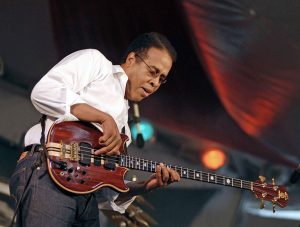 Which are your latest news? Are you doing any recordings this period?
Which are your latest news? Are you doing any recordings this period?
I’m working on a new record for my solo band. Then, I ‘m working for a while on a special record, a more classical bass record. The main thing that I’m working on today is a record for my band, a follow-up to “The Stanley Clarke Band Album” we did in 2010.
Are you satisfied with the feedback you got from fans and press for “The Stanley Clarke Band Album”?
Yeah, absolutely! People really liked that album. We toured around the world for that album and I’m very happy because we worked very hard.
In late May you were honoured by your hometown of Philadelphia and Mayor Michael Nutter with “Stanley Clarke Day”. How much emotional was that day for you”?
It was very emotional for me because most of my family lives there. My family who live there and they are still alive. My aunts and my uncles were all there. They are in their late 80s, early 90s. They are very old but they are very strong people. But also all my high school friends were there. Pretty much everyone from my graduating class. It was very interesting to meet up with people after 40-45 years. It was very emotional and very nice to be there that day.
Did you enjoy your recent tour with George Duke (solo, Frank Zappa – keyboards)?
Yeah, George is one of my oldest friends. I know him since 1970. He’s a really intelligent guy, his playing is very soulful. He’s very, very funny person. Whenever I tour with George, it ‘s like going on vacations.
Are you proud of the classic status that “School Days” song and album have until today?
Yeah, I’m very lucky and I feel very fortunate to have been connected with a classic album. “School Days” is a classic album. I think one or two Return to Forever albums are classic albums too. It’s very nice to be part of something like that. As a matter of fact, every place I go there is always someone who knows the song “School Days”. Everywhere.
It’s your “Stairway To Heaven”.
(Laughs) Yeah, yeah! I’ve been in places in Africa, like in jungle, someone would come and shout “School Daaayyyss” (laughs)!! It’s great, I’m very happy to have a classic album.
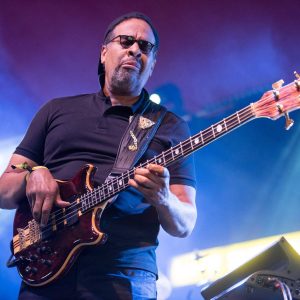 You are the first bass player who did sold-out concerts and had gold records as a solo artist. Did you expect that success?
You are the first bass player who did sold-out concerts and had gold records as a solo artist. Did you expect that success?
No, no. When I started I didn’t really have the idea of what fame is. You know, we were kind of underdogs. We did something that was completely new. Even the idea of a bass player having a solo album, like the way I do, as an electric bass player, was a new idea. I don’t think that anyone else had previously done anything like that. So, it was new and always surprise me how many people have bought those albums.
Can you explain us why acoustic and electric bass are two completely different worlds for you?
Because the electric bass is really a guitar, a bass guitar. The acoustic bass is played different ways. You spread out the sound and it has different fingering than the electric bass. So, eventually even though the concept of the music is the same, the playing itself is actually very different technically. You play the acoustic bass with different fingering than the electric bass.
When did you first realise that you have a special gift on bass, that you are not the average bass player?
You know I hear from people that I’m a little bit different, but I always thought that I’m the average.
No, no (laughs) !
(Laughs) When I was younger I had many friends. I grew up with many bass players that I had friends. But I never saw myself apart of the others. I never saw myself as something special. Ofcourse, there were things that I could do but other bass players didn’t do. I mainly attributed that to practicing. I think I just practiced a little bit longer these days. When I was young I really spent a long-long time practicing. I still practice. I still learn things on bass, I don’t think I will ever stop that. I think that is one of the best things that I learned when I was very young: practice. Never stop playing.
How was being in a band (The New Barbarians) and touring with Keith Richards and Ronnie Wood?
That was a lot of fun. That was all fun. From the moment it started to the time it ended. There was a lot of fun playing with these guys. I really enjoyed. I was getting my 100% old rock ‘n’ roll experience. It was great, it was really 100%.
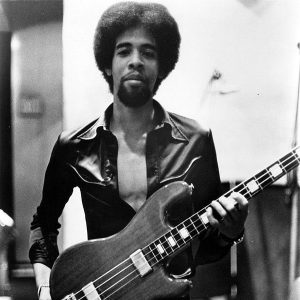 Jeff Beck has said that you are the best musician he has played with. Do you have happy memories from the period you played with Jeff Beck?
Jeff Beck has said that you are the best musician he has played with. Do you have happy memories from the period you played with Jeff Beck?
You know what I like about Jeff? Nobody plays like Jeff. Nobody can play like him. In Jeff’s way of playing, I think he’s the best. He’s the best on what he does. He has his own style. Nobody plays the melodies like Jeff Beck. He has the greatest sound, he has most beautiful sound in guitar and the way he interprets a melody is unique.
Do you think you could have done more things together?
With Jeff? I would like to do some more stuff with Jeff. I think when the time comes I would like to do something with Jeff. I would like to come out and tour. I think we could plan it for sometime in the future and it would be nice.
Tony Williams come out from Boston and joined Miles Davis when he was 17. Do you think there are those kinds of opportunities today?
Ah, yeah. Basically he was a young guy that came up and played with the older jazz musicians. Still we have old jazz musicians around (laughs)! Yes, young guys can come along. There are tremendous young musicians who come up and play. What lacks now is (pause)..
The originality.
Yeah, it’s different now because you don’t have people who look at instrumental musicians, young instrumental musicians. I think they have suspended the interest that they had when I was young. The music business right now is very-very-very strange. In music business there are people that I think they don’t really understand all kinds of music. When I was young there were great-great music executives like Ahmet Ertegun (ed: the Turkish founder of Atlantic Records). He was a tremendous guy, we would on one day go see The Rolling Stones, and the second day he would go see Miles Davis, on the third day he would go see Ray Charles. He was a true record executive.
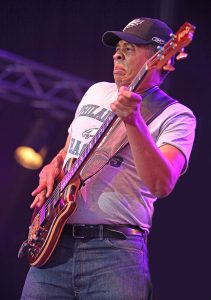 He signed Led Zeppelin.
He signed Led Zeppelin.
And Led Zeppelin, yes. And the original Rolling Stones records were under Atlantic Records. He signed The Rolling Stones. He was a guy who had the ability and listened to many kinds of music. We don’t have those kinds of executives right now. The executives today are very short-minded and their minds are not extended enough. I don’t want to say that they aren’t intelligent, but they don’t have the ability to see things. There is a guy who has a rap record company. Then there is a record company for electronic music. It’s very limited. Because instrumental musicians don’t sell a lot of records but instrumental musicians traditionally around history have made culture what it is. In every country. In your country there are some tremendous instrumental musicians but they may not sell millions of records, but they are recognized as genius. And when you think of Greece, you think of them. When you come to the United States and you think of great trumpet players, you think of Miles Davis. Miles never sold 50 million records but he is Miles Davis. Think of Dave Brubeck, John Coltrane and Jimi Hendrix, they never sold millions of records, but they were tremendous musicians. I think the problem with the music business over the last 25 years is that the executives in the music industry they all have been interested in sales. How many records should sell. So, what happened is that record executives made artists to copy other artists who sell. So you have Madonna, but you gotta have someone like her in Greece. Or you have Michael Jackson, you gotta have a Japanese Michael Jackson. That’s not the way to make an artist. A great artist comes out from what he feels in his heart. Like Jimi Hendrix, he wasn’t copying anybody. And Miles Davis wasn’t copying anybody. But today you’d never have a Jimi Hendrix. Today the way the record business is, you’d never have The Beatles. Ever. You would never have Miles Davis. Definitely you won’t have another Coltrane, definitely you won’t have Duke Ellington. Because music industry is concentrating on other things, other ways of creativity. So, I think sometime, I don’t know how long it will take, this would come back around. Because the business all over the world is changing. Firstly, for musical reasons and secondly for technology reasons. The music will become more free. People they will want it free. I have a feeling that in the future lives shows are going to get bigger again. Maybe at one point no one would pay for a record. All will need the music free. I do know that live shows will be bigger and bigger. What is very interesting to me is that I have a lot of young fans who come to my shows and tell me that they watched me on Youtube. So, social media can actually be an advantage to young musicians, particularly to young instrumental musicians. Just keep playing. Keep playing.
Are you frustrated by the lack of coverage that your music receives from American mainstream media and radio stations?
No, we actually get quite a bit of coverage. We don’t get the type of the coverage that cares anybody is music yet: television. We don’t get television anymore. And radio. Nobody really wants to be played on the radio (laughs). Today’s radio is horrible.
Yes, but in the ‘70s you could listen to great music on the radio.
Yeah. In the ‘70s, and even a little bit in the ‘80s, the radio was very good. I remember when my “School Days” (1976) came out, the thing I loved was that “School Days” album was played on rock ‘n’ roll radio. Sometimes, I would drive my car in New York and I would hear Led Zeppelin and then I would hear “School Days”, then I would hear Frank Zappa. You know what I mean? It was not big deal back then.
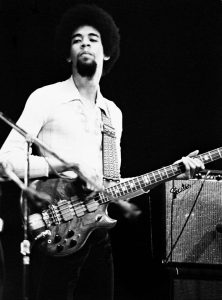 Today if you do this, they would think that you are insane.
Today if you do this, they would think that you are insane.
Yes. Now everything is the same. You listen to a radio station and you hear “doop-doo-doop/doop-doo-doop/doop-doo-doop/doop-doo-doop” (laughs). If it’s a rap radio station, everything is rap and so on. Unfortunately, they are very small-minded. Now, there is something very popular but I’m not sure if it’s a good thing: the shows that have singing, like American Idol. Every country has some version of it and it’s very popular right now. People love to vote, people love to vote. But does this actually create better music? I don’t know.
I’m very curious to learn: Who are your influences as a producer?
I love Quincy Jones. Also, I had the pleasure and I was very lucky to work with George Martin (the legendary producer of The Beatles).
My latest interview was with Sir George Martin and I ‘m the only Greek who has done this !
I was so sad when I heard that he is deaf. Imagine a guy who spent all his life in music and can’t hear music. That’s very sad. I saw him some years ago, I think in 2009, in London. Return to Forever were getting an award and he presented us and said a few kind words. He’s one of my favourite guys because he’s very smart. I like him because he’s very-very smart. He did a lot of different things. Also, Quincy Jones produced a lot of different people: Frank Sinatra, Michael Jackson, Rufus, all kinds of things. He’s very smart. I really liked the music he produced.
With who musician do you have the best musical and spiritual connection on stage?
I think there are two: I think Chick Corea (Return to Forever, Miles Davis -pianist) and then also George Duke. Chick is a very unique musicians and he has the ability to duplicate another musician when he plays. No one else in the world can do that. He is the best in this for years.
Is there anyone you’d like to play with and hasn’t happened yet?
Oh, let’s see. I ‘d like to play.. I don’t know. I have played with so many people.
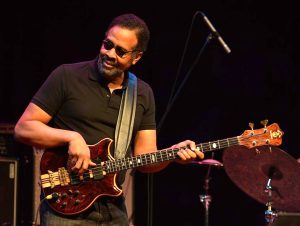 Maybe with Ry Cooder?
Maybe with Ry Cooder?
I love Ry Cooder. He’s great. I love a lot Ry Cooder. Playing bass it’s very interesting. I would like to play some blues with Buddy Guy (laughs). He’s crazy (mad laughs). He’s very crazy. I haven’t played much blues. I have played with B.B King once, you know. I love that music. I would love to play with Buddy Guy.
Do you miss your stolen Alembic bass you used in your early solo days?
Yeah, yeah! I still miss it. I wish the guy who stole it to give it back.
Are you happy with the triumphant return of the LP?
Yeah, ofcourse! Absolutely, yes.
Can you tell us a few words about the recent loss of Dave Brubeck (great jazz pianist)?
I met Dave Brubeck when I was 18 or 19 years old. Dave was playing in New Jersey and the bass player couldn’t make. So, they asked me because I was kind of the hottest player in Philadelphia and the gig was in New Jersey. New Jersey is near Philadelphia, so I got to play and I was really young. I could hardly read the music, I was scared to death. It’s funny because every time I came to see him in the last couple of years before he died, we always talked about that night. It was very nice to hang out with that man. He is one of the friendliest musicians that I ever met. He’s a great musician and it’s very-very-very sad that he passed away. But he had a good life, he had a long life. It was nice to see him even in his 90s, he wrote a lot of great songs. Everybody loved him.
Do you remember your feelings the first time you played with Dizzy Gillespie (great jazz trumpeter)?
I played with Dizzy at the Hollywood Bowl. He was amazing actually. You know, sometimes people when they become older, realise more things about what have done in their life. That time I couldn’t realise that I was playing with Dizzy Gillespie, the person who created bepop with Charlie Parker. It’s a great picture of being onstage with Dizzy Gillespie.
Were you shocked by the unexpected death of your friend Jaco Pastorius?
Yeah, I was. Because before he died he was in a hospital and he called me and he asked me to get him out of the hospital. I was trying to think how I could help him. And then some guy in San Francisco got him out of the hospital and maybe -I don’t know what happened- all I know is that after that it ended up somewhere and got killed. It was very sad because he was a great bass player and a good friend of mine. Many people thought that we were not friendly. But we were really-really good friends. He was coming to my house for many years in my son’s birthday and he gave to my son a present. My son wanted to become a baseball and he gave him a baseball glove. He was a pretty guy.
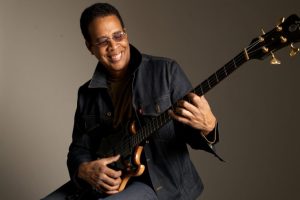 You got to know Miles Davis. Can you describe us that experience?
You got to know Miles Davis. Can you describe us that experience?
I never actually played a live concert with him but I lived a few blocks from him and I was going to see him in his home a lot. We played a lot of shows together. The best thing that I owe to Miles Davis is that I did some gigs with him, opening for him. I opened up as a solo bass player. I came up onstage and played bass and I have to credit Miles for that. I had to play 35-40 minutes bass alone onstage and then he would come on and it was great. I loved to go to his house and hang out with Miles. Lenny White (Return to Forever), the drummer, was a close friend to Miles and I often went to his house and talked with Miles.
How possible is to play soon in Greece?
You know, I ‘d love to play soon in Greece. I know people in Greece have some economic problems. I know that the promoter we used in Greece has some problems but I’m really ready to play Greece whenever a promoter says “come over”. I ‘m ready to play there.
A huge “THANK YOU” to Mr Stanley Clarke for his answers and to Diane Hadley for her valuable help.
Stanley Clarke Official Website: http://stanleyclarke.com
Stanley Clarke Official Facebook page: http://www.facebook.com/stanleyclarkemusic
Roxboro Entertainment Group Website: http://roxboroentertainment.com
Stanley Clarke Music Foundation: http://stanleyclarke.org

